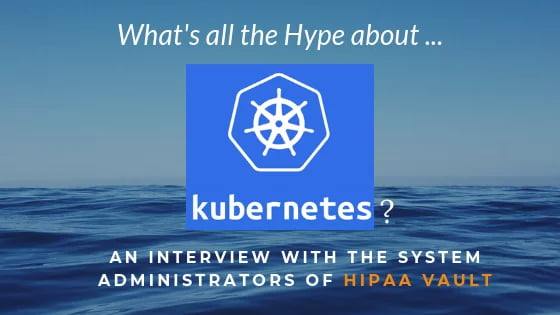
What is Kubernetes, or K8s?
Kubernetes, or “K8s” as it’s popularly known, comes from a Greek word meaning “pilot,” or “helmsman.” Based on the original, internal Google code used to run their search ads and apps (and geekily named after the Star Trek: Voyager Borg drone known as ‘Seven of Nine’), it purports to warp infrastructure automation into new frontiers of efficiency and scalability.
We asked Gil Vidals, David Breise, and Rick Montezuma of HIPAA Vault to explain – on a practical level – what the hype is all about.
David: Kubernetes is an orchestration platform, initially launched by Google, that has the ability to efficiently manage and scale the “containerized applications” of our customers. The advantage of these independent Linux containers is that they can essentially run isolated from their surroundings, since they possess all the “self-contained” applications (code and system tools) to run them. Even if our customer’s applications aren’t containerized initially, we can provide that service for them (known as Containers as a Service (CaaS)). This allows K8S to run, scale, and manage those containers, effectively eliminating many of the manual processes involved in the deployment of new applications.
What advantage(s) – if any- has K8S brought to your customers?
Rick: One of our customers needed to significantly expand their infrastructure. Instead of opting for a traditional “single server” solution, K8S allowed us to offer a more elegant system that would permit continuous development, testing, and deployment of web applications – all without having to take their website offline. K8S also gives us seamless load balancing based on traffic, and we can set parameters so that the auto-scaling of their servers won’t go beyond preferred limits.
How does this end up being cost-effective for the customer?
Rick: Essentially, the cost-savings comes through better utilization of resources. The power of Kubernetes is its ability to automatically choreograph and manage these stand-alone, containerized applications, as well as groups of resource-sharing containers, known as “pods,” from a single interface in various cloud deployments utilizing a system of Master and Worker nodes. The scaling that K8S provides allows us to revisit their account more often, and make adjustments to their plan as needed.
How does adopting Kubernetes improve IT Operations?
Gil: Obviously, Google knows something about handling large-scale deployments, without sacrificing security or uptime – a primary concern for a compliant, managed security service provider like HIPAA Vault. Kubernetes provides an elegant method for managing clusters of containers. Ultimately, we’re able to reduce the number of servers needed, while deployment, compute, and scaling efficiency are all greatly improved.





